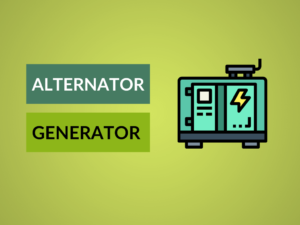Difference Between Motor and Generator
Electric motors and generators are both devices used in the field of electrical engineering, but their functionality and purpose differ significantly. This article aims to explore the differences between motors and generators, including their definitions, examples, uses, and a detailed table highlighting their distinctions in various areas.
What is a Motor?
A motor is an electrical device that converts electrical energy into mechanical energy. It provides the necessary power to drive machines, appliances, and various mechanical systems. Motors work based on the principle of electromagnetic induction by using the interaction of magnetic fields in the presence of an electric current.
Examples of Motors
There are different types of motors used in various applications. Some common examples of motors include:
- Electric fans
- Vacuum cleaners
- Washing machines
- Refrigerator compressors
- Electric vehicles
Uses of Motors
Due to their ability to convert electrical energy into mechanical energy, motors find extensive use in numerous industries and applications. Some common uses of motors include:
- Industrial machinery and equipment
- Automobiles and transportation
- Home appliances and electronics
- Robotics and automation
- Medical devices
What is a Generator?
A generator, also known as an alternator, is an electrical device that converts mechanical energy into electrical energy. It utilizes the principle of electromagnetic induction by rotating a coil of wire inside a magnetic field to create a flow of electric current. Generators are commonly used to produce electricity in power plants and as backup power sources.
Examples of Generators
Generators are used in various scenarios where there is a need for electricity generation. Some examples of generators include:
- Power plants
- Diesel or gasoline-powered portable generators
- Wind turbines
- Solar panels (as part of a larger system)
- Hydroelectric power systems
Uses of Generators
Generators serve a crucial role in providing electrical power in situations where there is no access to a stable grid connection. Some common uses of generators include:
- Backup power during power outages
- Remote locations with no access to the power grid
- Construction sites and outdoor events
- Emergency situations and disaster relief efforts
- Supplemental power for renewable energy systems
Differences between Motor and Generator
| Difference Area | Motor | Generator |
|---|---|---|
| Functionality | Converts electrical energy into mechanical energy. | Converts mechanical energy into electrical energy. |
| Operating Principle | Based on the principle of electromagnetic induction. | Based on the principle of electromagnetic induction. |
| Direction of Energy Conversion | Electrical to mechanical. | Mechanical to electrical. |
| Energy Source | External electrical power source. | Mechanical energy (e.g., fuel, wind, water). |
| Output | Mechanical work or movement. | Electrical current or power. |
| Applications | Driving machinery, appliances, and mechanical systems. | Generating electricity in power plants or as backup power. |
| Components | Stator, rotor, and electrical windings. | Stator, rotor, and electrical windings. |
| Power Flow | Electrical power is converted into rotational mechanical power. | Mechanical power is converted into electrical power. |
| Speed Control | Speed can be controlled using voltage or current regulation. | Speed can be controlled by adjusting the mechanical input. |
| Efficiency | Motor efficiency is typically high. | Generator efficiency varies depending on the type and size. |
Conclusion
In summary, the main difference between motors and generators lies in their functionality and energy conversion direction. Motors convert electrical energy into mechanical energy to drive machines and appliances, while generators convert mechanical energy into electrical energy to produce electricity. These devices have different applications, energy sources, and outputs, but share similar operating principles based on electromagnetic induction.
People Also Ask:
1. Can a motor be used as a generator?
Yes, motors can be used as generators by supplying them with mechanical energy instead of electrical energy. However, not all motors are designed to efficiently function as generators.
2. What is the difference between an AC motor and a DC motor?
The main difference between AC (alternating current) motors and DC (direct current) motors lies in the type of electrical supply they require. AC motors run on alternating current, while DC motors require direct current as the power source.
3. Are generators more efficient than motors?
The efficiency of generators and motors depends on various factors, such as size, design, and operating conditions. Generally, motors tend to have higher efficiency than generators.
4. Can a motor run on DC power?
Yes, some motors are specifically designed to operate on DC power. However, many motors used in everyday devices and appliances run on AC power and require an inverter to convert DC power to AC.
5. Can generators produce variable frequency electricity?
Yes, certain types of generators, such as inverter generators, are capable of producing variable frequency electricity. This feature makes them suitable for powering devices that require different frequency outputs.


